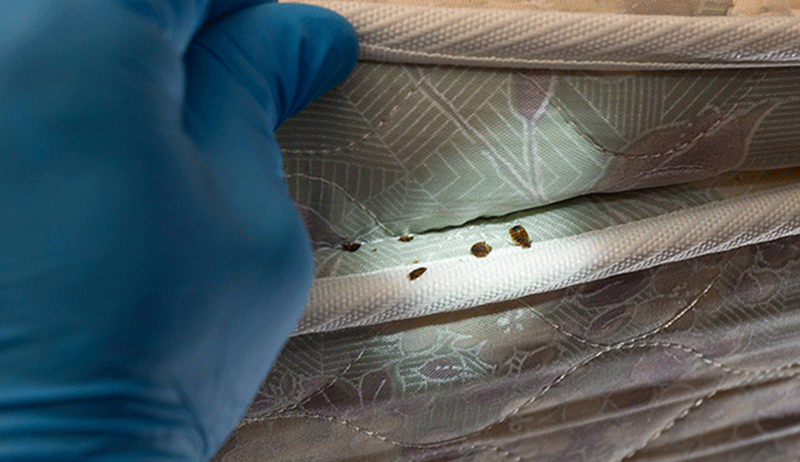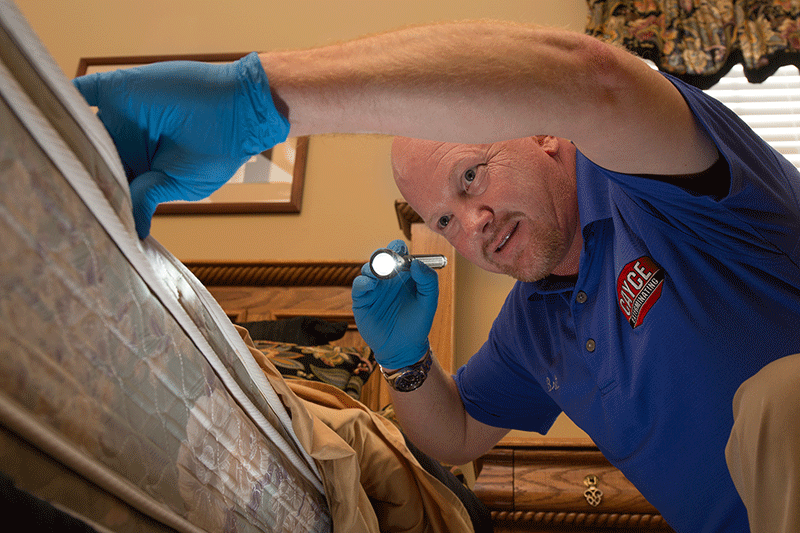Bed Bugs
"Sleep tight, don't let the Bed Bugs Bite" is back! The United States is facing a resurgence of bed bugs after 6 decades of living bed bug free. The incidence of bed bug infestation has increased 500% in recent years. Are you noticing itchy areas and bites and do not know where they came from? If so, you may have bed bugs! You can unknowingly be exposed to bed bugs by:
- Staying in a motel or traveling on an airplane or other public transportation
- Purchasing pre-owned clothing, handbags, mattresses and furniture
- Entertaining overnight guests
- Visiting a movie theater
Bed Bug Signs include:
- Blood stains on your sheets, pillowcases or mattresses
- Dark or rusty spots on sheets and mattresses, bed clothes and walls
- Live Bed Bugs that are reddish-brown in color and look similar to an appleseed
- Egg shells or molted skins
Bed Bug Inspection
A Cayce Exterminating Bed Bug Specialist will perform an extensive inspection of the suspected areas of infestation and surrounding living spaces and:
- Correctly identify the pest
- Customize a Treatment Plan to safely and quickly eliminate Bed Bugs from the infested areas
- Provide a written Preparation Check List for the client before scheduled treatment date
Bed Bug Treatment
Our Bed Bug Plan may include:
- Applying a Non-Repellent Pesticide into cracks and crevices and other harborage areas
- Applying dusts into wall voids and electrical outlets
- Performing localized heat treatments to furniture and other items that cannot be placed into a dryer
- Supplying and installing Bed Bug certified mattress and box spring encasements
- Vacuuming and removing live Bed Bugs, casings and eggs
- Includes an Extensive Initial Treatment and follow up
- Bed bug detection dog is available for pre- or post-treatment inspections and detection
A recent study by Ohio State University shows that over-the-counter bug bombs will NOT get rid of a bed bug infestation. To get rid of your bedbugs, contact Cayce Exterminating today!
Frequently Asked Questions
Bed bugs (Cimex lectularius) are small, flat, parasitic insects that feed solely on the blood of people and animals. Bed bugs are reddish-brown in color, wingless, range from 1mm to 7mm (roughly the size of Lincoln’s head on a penny), and can live almost a year without a blood meal.
Bed bugs are found across the globe from North and South America, to Africa, Asia and Europe, but tend to live close to a human environment. Although the presence of bed bugs has traditionally been seen as a problem in developing countries, it has recently been spreading rapidly in parts of the United States, Canada, the United Kingdom, and other parts of Europe. Bed bugs have been found in five-star hotels and resorts and their presence is not determined by the cleanliness of the living conditions where they are found.
Bed bug infestations usually occur around or near the areas where people sleep. These areas include apartments, shelters, rooming houses, hotels, cruise ships, buses, trains, and dorm rooms. They hide during the day in places such as seams of mattresses, box springs, bed frames, headboards, dresser tables, inside cracks or crevices, behind wallpaper, or any other clutter or objects around a bed. Bed bugs have been shown to be able to travel over 100 feet in a night but tend to live within 8 feet of where people sleep.
One of the easiest ways to identify a bed bug infestation is by the tell-tale bite marks on the face, neck, arms, hands, or any other body parts while sleeping.
However, these bite marks may take as long as 14 days to develop in some people so it is important to look for other clues when determining if bed bugs have infested an area. These signs include:
- the bed bugs' exoskeletons after molting
- bed bugs in the fold of mattresses and sheets
- rusty-colored blood spots on the mattress or nearby furniture
- a sweet, musty odor
Currently, bed bugs are not considered to be a medical or public health hazard. Bed bugs are not known to spread disease. Bed bugs can be an annoyance because their presence may cause itching and loss of sleep. The itching can lead to excessive scratching that can increase the chance of a secondary skin infection.
A bed bug bite affects each person differently. Bite responses can range from an absence of any physical signs of the bite, to a small bite mark, to a serious allergic reaction. Bed bugs are not considered to be dangerous; however, an allergic reaction to several bites may need medical attention.


